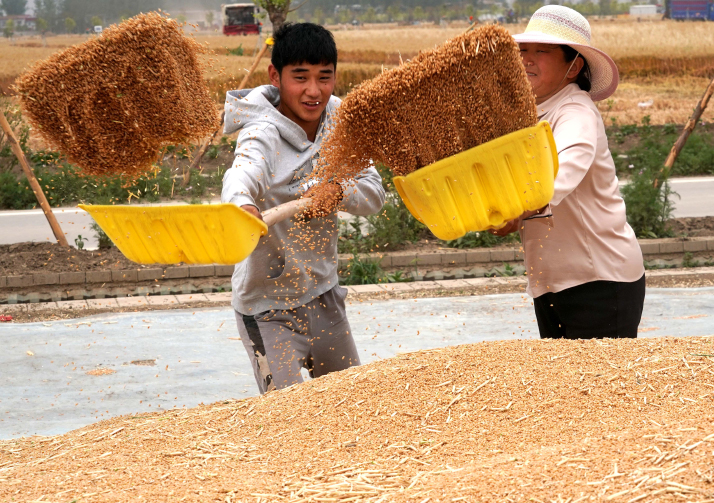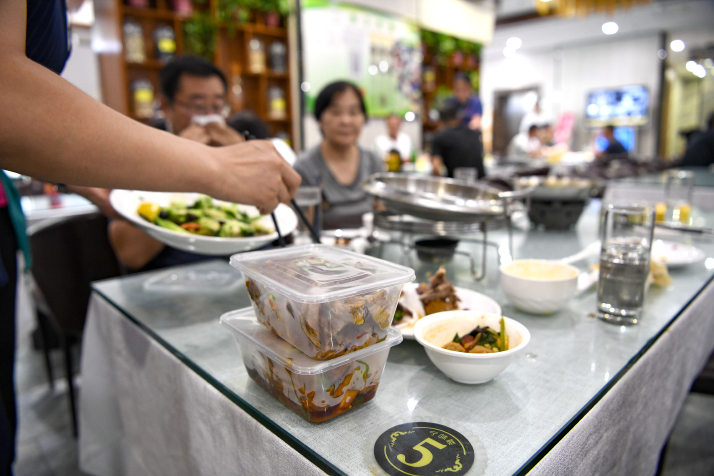| China |
| Creating greater awareness to end food waste remains national priority | |
|
|
 Farmers stack harvested wheat in Nanling Village, Henan Province in central China, on May 29 (XINHUA)
Liu Jingyang, a 28-year-old bank clerk living in Beijing, loves watching food shows on live-streaming platforms after a long day at work, feeling that viewing the vloggers eating is very relaxing at bedtime. "It's a very healing process to just think about nothing while watching people eat all that colorful and inviting food and seeing their overreactions as they enjoy it," Liu told Beijing Review. She said she is also curious about how people can eat more than 10 times what she can.
However, some of these big eaters have recently been caught "fake eating," vomiting after pretending to have eaten, leading to much food waste. They immediately came under fire from the public. The anger was fueled because many critics are aware that approximately one in nine people in the world are starving, based on statistics from the UN Food and Agriculture Organization (FAO). In addition, food-wasting food shows are misleading because they go against the value of thriftiness, Cheng Shengkui, a researcher at the Institute of Geographic Sciences and Natural Resources Research, the Chinese Academy of Sciences, told state broadcaster China Central Television (CCTV). "They're disrespectful to both food and health," Liu said. Eating for show
Before gaining popularity in China in about 2014, food shows were already big hits in countries such as the Republic of Korea and Japan. During these live-streams, vloggers eat loads of food while interacting with their audiences. Some also make videos and upload them to video-sharing platforms like YouTube and China's Bilibili. The mouth-watering treats and extravagant meals are the main reasons for viewer attraction, according to a paper published in 2018 in Today's Massmedia, a Chinese academic journal. Some people, especially women on diet, satisfy their hunger for food watching the shows. Some vloggers are slim but can eat a huge amount of food within the given time, making many curious about how they manage to do it. The big eaters' income mainly comes from advertisement revenue, donations or tips by viewers, sales of commodities or commissions from other affiliated programs. Famous broadcasters can earn more than $1 million a year. But as the market became more lucrative, some people who can't really eat a huge amount of food but still wanted to grab the money from audiences and advertisers, began to resort to fake eating. With more media reports exposing dishonest acts and food waste, the industry has had to undergo reform. Several live-streaming platforms have announced that they would strengthen scrutiny of food shows, while some live-streamers voiced opposition to food waste and advocated thriftiness. Wang Sixin, a professor at the Beijing-based Communication University of China, said food shows should promote healthy eating habits and a sound dining culture.  People have their leftovers packed at a restaurant in Yinchuan, Ningxia Hui Autonomous Region in northwest China, on August 15 (XINHUA)
Empty your plate According to a report released by FAO, the global volume of food waste is estimated at 1.6 billion tons of "primary product equivalents," with the loss of edible food amounting to 1.3 billion tons. At banquets where people gather to celebrate birthdays, graduations, promotions or other milestones, there is still a grievous amount of food waste, Cheng said. "I used to be afraid that if I ordered only a few dishes or packed the leftovers when I treated friends or colleagues at a restaurant, they would think I was being cheap," Zhang Jie, a 31-year-old business consultant in Beijing, said. President Xi Jinping has repeatedly called for putting an end to wasting food. In his latest push in August, he described food waste as shocking and distressing, and highlighted the need to maintain a sense of crisis regarding food security, especially amid the fallout of the novel coronavirus epidemic. Xi also emphasized enhancing legislation and supervision, taking effective measures and establishing a long-term mechanism to stop food waste to bolster the nationwide campaign called Empty Your Plate, launched in 2013. As part of the campaign, restaurants offered smaller portions and encouraged customers to take their leftovers home. Posters in support of a more frugal lifestyle sprang up in streets and restaurants across the country. The term "empty your plate" appeared on a list of the top 10 buzzwords for 2013 released by the Ministry of Education and the State Language Commission. It is now a social media trend to post pictures of finished dishes and empty plates. A post by CCTV on Weibo, one of China's most used social media platforms, implored, "Please save food and reject waste!" The account has over 100 million followers. Recently, some cities have begun taking more measures to prevent food waste and promote moderate consumption. In Shijiazhuang, Hebei Province in north China, local authorities launched initiatives such as suggesting diners order dishes at restaurants following an "N-1" model, which refers to ordering one dish less than the amount of people. Restaurants are also encouraged to offer smaller or half portions. At a campus canteen at Jiangxi University of Science and Technology in Ganzhou, Jiangxi Province in east China, diners can exchange their empty plate for a piece of fruit when they exit. Wang Junyi, head of the university's campus service and management center, said the daily food waste has been reduced by two thirds since the canteen launched this initiative in 2013. It is also a common practice for buffets nationwide to charge a penalty for uneaten food in addition to posting signs on walls and tables that remind people not to waste food. The Empty Your Plate campaign has also facilitated anti-corruption efforts. Some government officials used to misuse public funds on extravagant banquets with pricy dishes they rarely finished. Regulations have been introduced to ban lavish banquets, and officials who spend large sums of public money on banquets will be disciplined. Li Puliang, a professor at Huizhou University in Huizhou, Guangdong Province in south China, said multiple parties, including households, restaurants, schools and government departments, should work together to reduce food waste. "Parents and teachers should educate children to develop thrifty habits, while the government should step up legislation to stop food waste," he said. (Print Edition Title: Waste No More) Copyedited by Rebeca Toledo Comments to luyan@bjreview.com |
|
||||||||||||||||||||||||||||
|